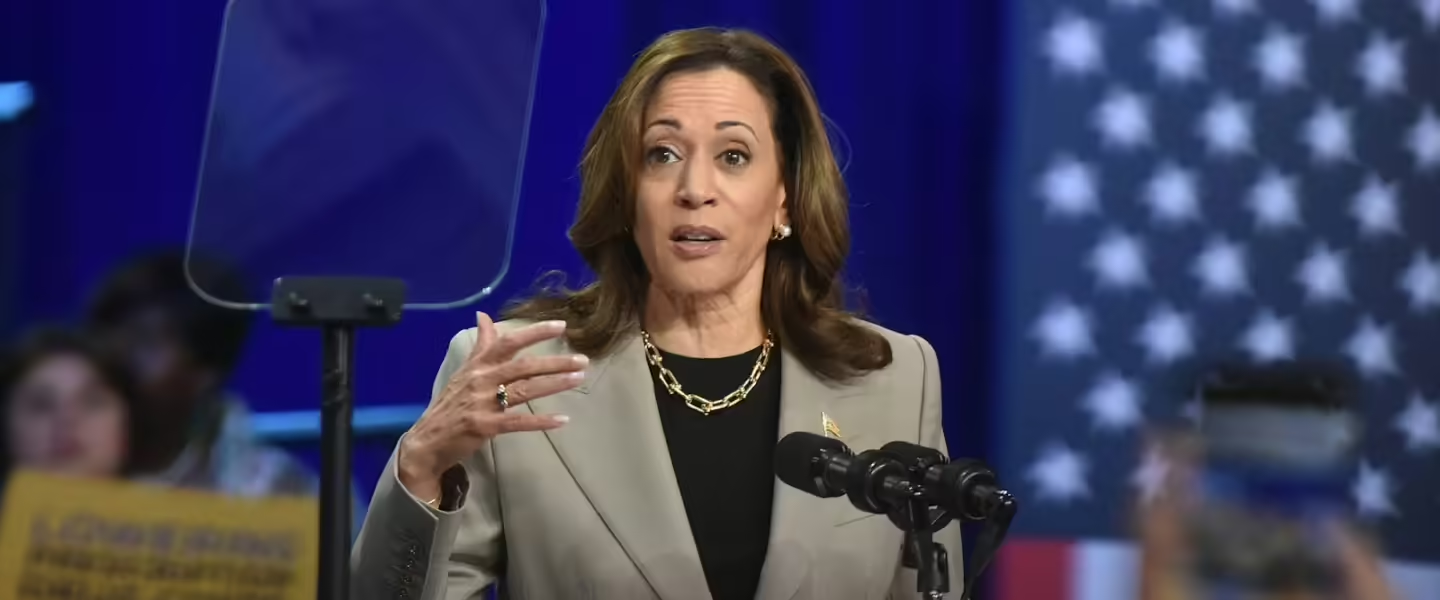Will Harris Go After Big Oil?
The candidate has kept her climate policy vague so far, but her record as a prosecutor gives climate activists hope.
|
Listen To This Story
|
On the campaign trail for the 2020 election, the Democratic candidates for president, including then-US Sen. Kamala Harris, D-CA, outlined in detail their plans to combat climate change — with Joe Biden even vowing to halt oil and gas drilling on federal lands.
Now, Harris has been more vague during her month as her party’s presidential nominee — mentioning climate change only in passing, offering no specific plans as yet to reduce climate-altering emissions, and failing to call out the role of fossil fuel production in accelerating the global crisis.
In her one mention of the oil and gas industry, Harris proudly told campaign workers on July 23 that “as [San Francisco] district attorney to go after polluters, I created one of the first environmental justice units in our nation. Donald Trump stood in Mar-a-Lago and told big oil lobbyists he would do their bidding for a $1 billion campaign contribution.”
The focus on her record as a prosecutor could signal how her climate agenda will differ from that of the Biden administration, which has centered on incentivizing companies and government officials alike to expand renewable energy. Harris is expected to continue implementing many of Biden’s ambitious initiatives to address climate change and hasten the transition to a clean energy future, according to climate experts, but her approach is likely to be more aggressive.
Per the party platform adopted at the Democratic National Convention:
Going forward, Democrats will keep working to incentivize investment in transmission upgrades and new lines, and in the grid-component manufacturing that’s needed to support that growth. We will improve and speed up the processes of environmental review and clean-energy permitting; and further scale up development of clean energy on public lands.
Last month, the GOP released its own platform at its convention in Milwaukee, which didn’t include a single mention of climate change. And Trump has repeatedly emphasized his intention to “drill, baby, drill” if he wins back the White House. Recently, he took his stance a step further by attacking efforts to reduce greenhouse gas emissions in a post on Truth Social, writing that “Net Zero will be DEAD on Day One!”
Biden’s climate agenda has consisted largely of “more carrots than sticks” — focusing on incentives to promote clean energy production and use of renewable energy rather than taxes and regulations that punish the fossil fuel industry — Jeff Ordower, North America director of 350 Action, a global environmental advocacy group, told Capital & Main. The administration has taken credit for the fact that companies have announced $900 billion in clean energy and manufacturing investments since the start of Biden’s term.
Harris could adopt a strategy that is focused more on the sticks, Ordower said, given her record as California’s attorney general, which includes suing big oil companies over their impact on groundwater, getting multimillion dollar settlements from ConocoPhillips, Phillips 66, and BP. As the state’s top prosecutor, she also investigated ExxonMobil over its climate change disclosures and prosecuted Volkswagen for using emissions-cheating software in its cars. And she obtained a criminal indictment of an oil company over a 2015 spill off the coast of Santa Barbara.
As a US senator, she supported the Green New Deal and sponsored an ambitious set of legislation that would have replaced school buses with electric models, reduced lead and other pollutants in drinking water, and required budget offices in the White House and Congress to take environmental justice into consideration when developing regulations. Those bills failed to pass, but many of the proposals were later adopted by the Biden administration.
As vice president, Harris has been credited with playing a key role in advancing environmental justice programs, such as the Justice40 Initiative, which seeks to ensure that 40 percent of the benefits of federal climate and clean energy investments are directed to disadvantaged communities. As for other Biden priorities, such as prosecuting civil rights cases tied to environmental pollution, the administration has been less successful, largely due to opposition from states including Louisiana and Alabama. And Biden has so far failed to nominate someone to lead the new Office of Environmental Justice and External Civil Rights, which was established two years ago.
But activists hope to see Harris soon take a tougher approach. “She’s the hammer,” environmental activist Vernice Miller-Travis told E&E News. “That’s what environmental justice constituencies have wanted forever: enforce the law, equitably enforce the law.”
And Collin Rees, political director of Oil Change International, said Harris could be “stronger” than Biden on climate policy, pointing out her efforts to target the oil and gas industry as both a prosecutor and lawmaker.
Some in the oil and gas industry also expect her to be more aggressive in her approach to the fossil fuel sector. Democrats are likely to halt pending legislation to undo Biden’s ban on the export of liquified natural gas, Tom Sharp, the director of permitting intelligence for market research firm Arbo, told industry publication Hart Energy, which notes that Harris is perceived as being less “accommodating” to the oil and gas industry than Biden.
Suspicion of Harris’s true stance on fossil fuels is in part due to her shifting positions on fracking — she vowed to ban it in 2020 but now opposes such a ban.
“Until the vice president says otherwise, we have to believe she still stands for everything that was in her 2019 policy plan and for every policy she co-sponsored as a senator,” Chet Thompson, CEO of American Fuel & Petrochemical Manufacturers, a refining trade group, said in a statement.
This story by Marcus Baram was originally published by Capital & Main and is part of Covering Climate Now, a global journalism collaboration strengthening coverage of the climate story.


